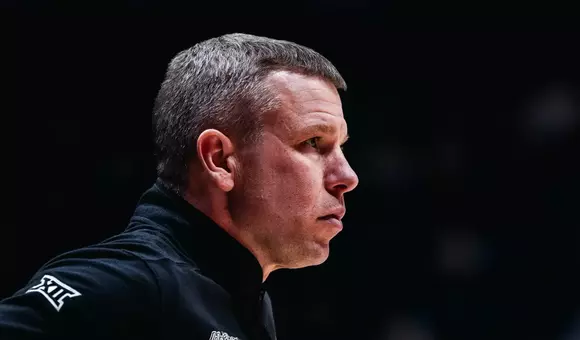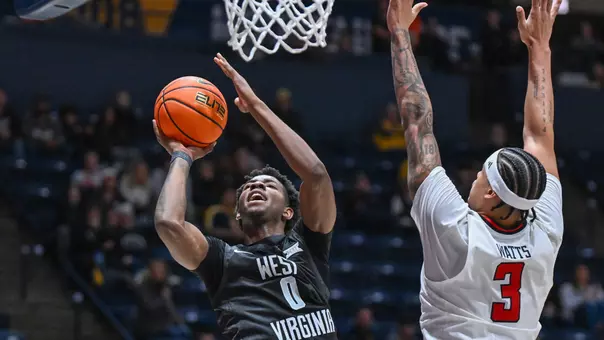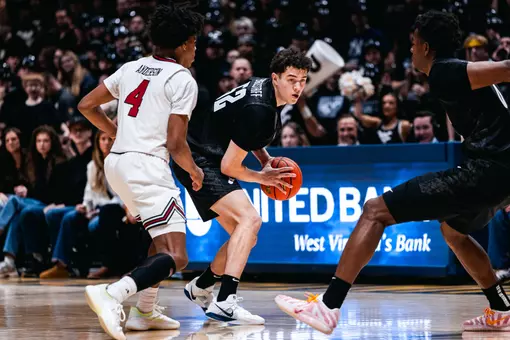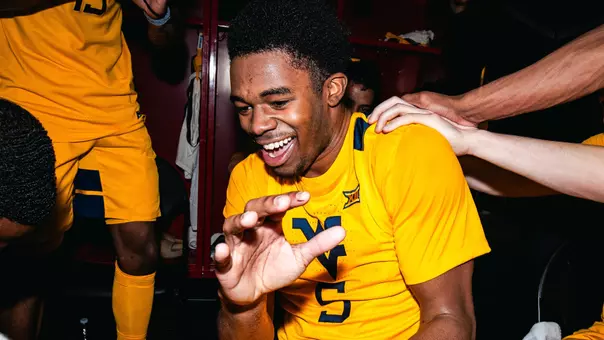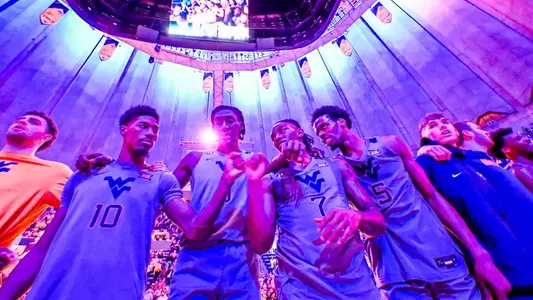
Photo by: All Pro Photography/Dale Sparks
DeVries Joins Short List of One-Year Mountaineer Coaches
March 19, 2025 10:35 AM | Men's Basketball
MORGANTOWN, W.Va. – The Darian DeVries era as West Virginia University's 23rd men's basketball coach ended yesterday - six days short of one year.
His one season here saw the Mountaineers win 19 games and have their postseason hopes end in Kansas City where they were upset 67-60 by 16th-seeded Colorado in the Big 12 Tournament.
Despite having a resume worthy of NCAA Tournament participation by all bracketologists, the Selection Committee instead opted for North Carolina and Xavier, making West Virginia the first team out of the tournament.
It will likely go down as one of the biggest snubs in tournament history.
The NCAA snubbing and guard Javon Small's incredible season are the two things that will be most remembered about DeVries' brief time in Morgantown.
In terms of brevity, it now joins the one-year tenures of John Purinton (1904), James Jenkins (1908), Rudy Baric (1943), Harry Lothes (1944), John Brickels (1945) and Josh Eilert (2024).
Most of these came under extenuating circumstances.
Purinton was getting the first team established in 1904, and Jenkins, four years later, was overseeing a squad that was about to disband for seven years because of inadequate playing facilities.
Baric and Lothes were Mountaineer players leading the team during World War II when coach Dyke Raese was on leave for military service, while Eilert's stint was on an interim basis following Bob Huggins' abrupt, summertime resignation.
Only Brickels' tenure in 1945 is comparable to DeVries'.
Brickels was a successful football and basketball coach at Huntington High when WVU athletic director Roy "Legs" Hawley hired the Newark, Ohio, native, to oversee the Mountaineer hoops fortunes in the summer of 1944. This came soon after Raese made it clear that he was going to pursue private business opportunities at the conclusion of the war.
Brickels, coaching a team comprised of freshmen and one sophomore, led the Mountaineers to a surprising 12-5 regular season record and a berth in the National Invitation Tournament at Madison Square Garden in New York City.
WVU lost its opening round game 76-52 to eventual tournament champion DePaul on March 19, 1945, and then less than a month later, Brickels informed Hawley that he was departing to take an assistant coaching position on Paul Brown's Cleveland Browns staff.
Cleveland was a new team in the All-American Football Conference, and Brickels was needed to help organize its roster. Two of the players Brickels unearthed were former Marshall standouts Ed Ulinski and Frank "Gunner" Gatski, an eventual Pro Football Hall of Famer.
What appeared to be a significant setback for WVU basketball turned into a blessing when Hawley hired former Princeton High boys coach Lee Patton, at the time coaching the Iona Prep boys' team in New Rochelle, New York.
Patton's first season in 1946 saw the Mountaineers win 24 of 27 games and advance to the semifinals of the National Invitation Tournament where they were defeated by eventual champion Kentucky 59-51.
That began a run of success that included a school record 57-game home winning streak, another trip to the NIT in 1947 and the development of some of the greatest players in school history, including Leland Byrd, Fred Schaus, Eddie Beach, Bobby Carroll, Clyde "Hard Times" Green and center Mark Workman.
Patton only coached Workman for one season, in 1950, before dying of a stroke two months after sustaining injuries during an automobile accident while traveling to a game against Penn State on Valentine's Day.
Patton's fast-breaking, up-tempo style was later adopted by Schaus when he returned to Morgantown following a five-year professional career to lead West Virginia to its Golden Era of basketball from 1955-60.
The period from 1946-65 is considered the most successful in school history.
His one season here saw the Mountaineers win 19 games and have their postseason hopes end in Kansas City where they were upset 67-60 by 16th-seeded Colorado in the Big 12 Tournament.
Despite having a resume worthy of NCAA Tournament participation by all bracketologists, the Selection Committee instead opted for North Carolina and Xavier, making West Virginia the first team out of the tournament.
It will likely go down as one of the biggest snubs in tournament history.
The NCAA snubbing and guard Javon Small's incredible season are the two things that will be most remembered about DeVries' brief time in Morgantown.
In terms of brevity, it now joins the one-year tenures of John Purinton (1904), James Jenkins (1908), Rudy Baric (1943), Harry Lothes (1944), John Brickels (1945) and Josh Eilert (2024).
Most of these came under extenuating circumstances.
Purinton was getting the first team established in 1904, and Jenkins, four years later, was overseeing a squad that was about to disband for seven years because of inadequate playing facilities.
Baric and Lothes were Mountaineer players leading the team during World War II when coach Dyke Raese was on leave for military service, while Eilert's stint was on an interim basis following Bob Huggins' abrupt, summertime resignation.
Only Brickels' tenure in 1945 is comparable to DeVries'.
Brickels was a successful football and basketball coach at Huntington High when WVU athletic director Roy "Legs" Hawley hired the Newark, Ohio, native, to oversee the Mountaineer hoops fortunes in the summer of 1944. This came soon after Raese made it clear that he was going to pursue private business opportunities at the conclusion of the war.
Brickels, coaching a team comprised of freshmen and one sophomore, led the Mountaineers to a surprising 12-5 regular season record and a berth in the National Invitation Tournament at Madison Square Garden in New York City.
WVU lost its opening round game 76-52 to eventual tournament champion DePaul on March 19, 1945, and then less than a month later, Brickels informed Hawley that he was departing to take an assistant coaching position on Paul Brown's Cleveland Browns staff.
Cleveland was a new team in the All-American Football Conference, and Brickels was needed to help organize its roster. Two of the players Brickels unearthed were former Marshall standouts Ed Ulinski and Frank "Gunner" Gatski, an eventual Pro Football Hall of Famer.
What appeared to be a significant setback for WVU basketball turned into a blessing when Hawley hired former Princeton High boys coach Lee Patton, at the time coaching the Iona Prep boys' team in New Rochelle, New York.
Patton's first season in 1946 saw the Mountaineers win 24 of 27 games and advance to the semifinals of the National Invitation Tournament where they were defeated by eventual champion Kentucky 59-51.
That began a run of success that included a school record 57-game home winning streak, another trip to the NIT in 1947 and the development of some of the greatest players in school history, including Leland Byrd, Fred Schaus, Eddie Beach, Bobby Carroll, Clyde "Hard Times" Green and center Mark Workman.
Patton only coached Workman for one season, in 1950, before dying of a stroke two months after sustaining injuries during an automobile accident while traveling to a game against Penn State on Valentine's Day.
Patton's fast-breaking, up-tempo style was later adopted by Schaus when he returned to Morgantown following a five-year professional career to lead West Virginia to its Golden Era of basketball from 1955-60.
The period from 1946-65 is considered the most successful in school history.
Players Mentioned
United Bank Playbook: UCF Preview
Friday, February 13
Ross Hodge | UCF Preview
Thursday, February 12
Ross Hodge | Texas Tech Postgame
Sunday, February 08
Brenen Lorient & Harlan Obioha | Texas Tech Postgame
Sunday, February 08
